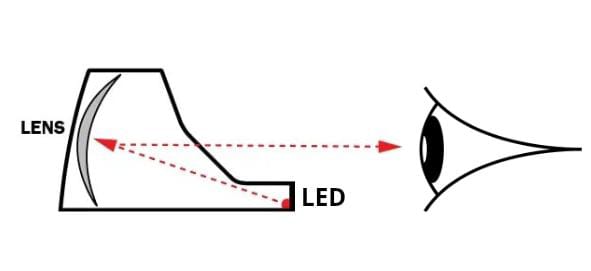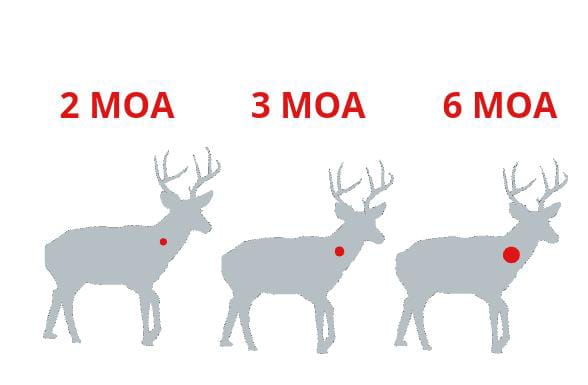A red dot sight is like the cool and popular new kid on the block, making traditional iron sights look less cool. With their increasing popularity, red dot sights are used for everything: range, competition, and law enforcement.
Red dot sights are reflex sights that give faster target acquisition than iron sights. In this article, I will focus on how red dot sights work.
Red dot sights are different from scopes because they have no magnification. As the name suggests, red dot sights use a red dot as its reticle. The reticle is also green sometimes, but we call them red dot sights for simplicity’s sake.
Note: Red dot sights is a broad term that includes reflex, prism, and Holographic sights, but our focus here is reflex sights.
Working Of A Red Dot Sight
A red dot sight uses an LED to project light onto a mirror. The mirror is specially coated, allowing all the colors to pass through and only reflect the red color on the front lens in the form of a dot. The shooter sees the dot and the target in one line.
The dot the user sees in a red dot sight is an illusion, not an actual dot. This red dot is not visible from the other side of the lens, so the target cannot see it. So, when you project your reticle on the assailant, only you see it, not the assailant. It is great because it doesn’t beware the target.

The dot and the target are blurred into one. So, the shooter focuses only on one thing: The red dot on the target.
The Benefits Of The Unique Working
The technology of the red dot sight is the reason behind many of its advantages.
- Speed and Accuracy
With iron sights, you have to align the rear and front sight, and then both to the target. But with a red dot, you only need to put the red dot on the target and pull the trigger. Instead of focusing on three points, you have to focus on only one. Due to this, a red dot gives faster and more accurate shots, which is necessary for a life-threatening situation.
- Shooting with Both Eyes
While using iron sights, keeping the non-dominant eye closed gives the shooter more comfortable shooting. However, with a red dot sight, you can shoot with both eyes open, which allows you to have situational awareness and minimizes the dangers of shooting. Situation awareness is imperative in a defensive situation.
- Shooting in Low-light
Shooting with a single point in low light is much easier than aligning many points. So, a red dot sight is an ideal choice for low-light situations.
Sighting In A Red Dot
Sighting in a red dot is an important part of its operation.
Inside the lens of a red dot, the reticle keeps moving in the direction of your head. If you move your head right, it will move to the right; when you move to the left, it will also do the same.
Of course, we need our red dot to stay in one place to project it onto our target. So, we achieve this by sighting in our dot.
Once you have sighted your red dot, the dot stays on the target. When you move your head, it will look like the dot has moved but will remain on the target.
How To Measure Red Dot Size?
We measure the size of the red dot in Moa. The most common Moa sizes for red dots are 2 Moa, 3 Moa, and 6 Moa.
A bigger Moa dot like the 6 Moa covers more area on the target, so it is preferably used to hit up close and bigger targets.
A smaller Moa dot like the 2 or 3 Moa doesn’t cover a large area on the target, so they are used to hit smaller targets at a distance.
We also have some red dots that come with multiple dot options, such as the Multiple Reticle System of the Holosun red dots.

Types Of Red Dot Sights
Based on Design
Based on the style or design, there are two types of red dot sights or reflex sights to be more accurate.
- Open Reflex Sight
An open reflex sight is a sight with an exposed emitter. These red dots sights have a less distorted view. But the emitter is exposed to dust and other such particles and can disrupt the projection of the reticle. Vortex Venom and Holosun HS507K-X2 are two popular open reflex sights.
- Closed Reflex Sight
In a closed reflex sight, the emitter is enclosed in the sight. The enclosed design protects the emitter from dust, debris, fog, and all other external elements, preventing the reticle from disruption and ensuring more reliability. Sig Romeo 5 and Aimpoint Pro are popular examples of a closed reflex sight.
Based on Size
Based on the size, again, there are two types of red dot sights.
- Standard Rifle Red dots
The standard-sized red dots are used with full-sized guns. A good example of a standard-sized red dot is Aimpoint Pro.
- Miniature Red dot Sights
The miniature red dot sights are used on handguns and as backup sights on rifles. They are also becoming very popular for concealed carry. Holosun 507k and Trijicon RMR are examples of miniature red dot sights.
Endnote
With time, red dot sights are increasing in popularity, and many companies today make reliable red dot sights for rifles and handguns. The unique working of the red dot sights allows the shooter to focus on just one point, i.e., the dot on the target, giving both speed and accuracy.
FAQS
Are red dot sights accurate?
A large part of accuracy depends on the shooter’s skill, but a red dot sight gives increased focus on the target, which helps the shooter with accuracy.
How far do red dot sights work?
Generally, a red dot sight works as far as 100 yards.
Do red dot sights need to be sighted in?
Sighting your red dot is a critical part of shooting with it. Once you sight in your red dot, the reticle stays on the target.
Are red dot sights better than iron sights?
Red dot sights have many advantages over iron sights; they are easier to use, give more speed and accuracy, and allow the shooter to keep both eyes open while shooting.